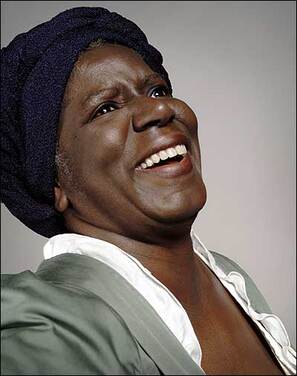 Photo Credit: Colonial Williamsburg photographer Tom Green
Photo Credit: Colonial Williamsburg photographer Tom Green When she left the room, there was applause as everyone looked at each other and collectively released their breath. But the event was not over. Our host then introduced the interpreter as herself, Valarie Gray-Holmes. She could now talk to us as a 21st Century citizen and refer to Nanny in the third person.
She introduced herself and then proceeded to tell us about her personal story and how it relates to Ann Ashby's history. She talked about personal struggle, her mother's and grandmother's struggle with each other, and about forgiveness and reconciliation. She talked about sexual assault, mistrust, and grudge-holding. Her mother could not imagine why she wanted to portray a black woman in an era where blacks were considered as property and inferior. She related the instance when her mother saw her interpretation of Ann Ashby for the first time and realized the connections that could be made. She finally understood and appreciated the importance of telling this woman's story among the predominantly white history of the Virginia Colony.
It all struck home with a few of the people in the room that afternoon, and some had tears and visible emotions in response. I was also hit hard by the account. But it wasn't necessarily an oppressed minority story that touched those people. It was the relationship that Valerie established with Ann Ashby. It was the developing relationship Valerie shared about her mother. And it was about her mother forgiving her late grandmother upon a newfound realization. In all of this - with everything falling into place and developing as it did - Valeria considered God's Providence to be at work.
The other participants went upstairs to find lunch when they finally acknowledged their appreciation to our presenter. When I came out of the restroom, everyone was gone, but Valerie was still standing in the hallway, getting her things together. I could not leave without saying something to her. I felt like she needed to know that her "performance" went beyond just the telling of a story of black history or racism, but that it also connected with someone who has recently experienced mental illness nearby, someone who went through an unforgiving situation and had the realization that grace trumps evil (even perceived evil), someone who connected with her personal story.
In talking to her as she stood there in period dress, my voice halted, and a lump developed in the center of my skull. My words stopped, and my lips pursed and trembled. Those burning tears behind my eyes burst forward, and I couldn't continue. In my desire to let her know that her story resonated with a white, landowning man, the connections and similarities kept coming forth in my mind, and it was overwhelming. Her own tears mingled with mine as we shared the importance and the brilliance of the connections and relationships that we have made, as well as the role of God and His direction in our lives. It was an incredible moment that I should never forget.
After a nice lunch with my new history brothers and sisters, I struck out onto Duke of Gloucester Street to look around. Most of the street was empty at this time of the evening, and I thought it would be a nice time to call home. A couple of the CWTI participants were a distance behind me, probably headed toward a bus stop to head back to our hotel, so for the most part I was alone. When my wife answered, she asked the traditional, "How was today?" and I didn't get very far before those heaving sobs hit me again. She was very patient as I talked through the crying to explain the experience of the day.
Those other teachers getting closer, I turned to walk down a side street, making sure to keep my back to them. I hadn't planned on breaking down in such a way in such a public location, right there in the focal portion of the most important street of Colonial Williamsburg. It's not something most folks experience - that thick and heavy emotion involving the 18th and 21st Century connections with history and humanity. Valarie Gray-Holmes, Ann "Nanny Jones" Ashby, and I were very fortunate to meet in a time when our stories could intersect so richly, and this was simply a one-of-a-kind experience that few people could ever comprehend.







































